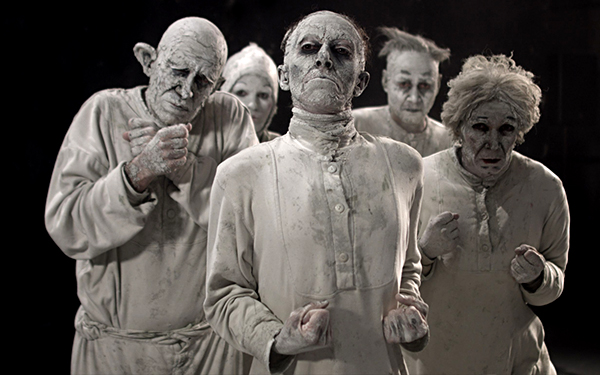The mechanisms of failure
Eight pieces of goldsmith’s craftwork, apparently unconnected to each other, testimonies to what silence and stillness can leave behind, coexist in a volume entitled Fizzles. Texts that were written over a period of fifteen years, finally brought together in one volume, after having been published independently, and which, as often happens with Samuel Beckett, on finishing a careful reading of each of them, we are left with the impression that the author has nothing more to say.
They are perhaps the narrative equivalent of what Beckett named dramaticules, rales of memory and imagination that explain themselves as nocturnal thoughts. One by one, we move through these fizzles further into the process of degradation, a process to which this writing inexorably leads us, degradation in terms of an almost purely physiological and excremental functioning, which turns each piece not into an alchemical residue, but into a deposition.
Fizzles, fiasco, detritus
Fizzle [foirade in French] means to crackle. A kind of insect buzzing, and also fiasco, “something that having started well has gone wrong”, like (in the popular sense) “diarrhoea”. This title (like the title of the English version, Fizzles) introduces the idea of an exhausted imagination that can only produce failures.
Each of these pieces, strung together almost at random – if this were possible with Beckett – thus shows the slow, inexorable process of loss, of dispossession characteristic of Beckett’s entire oeuvre. Here one does not possess, one dispossesses. If we accept that language is a way of understanding what surrounds us and, consequently, of possessing it, Beckettian texts aim to show the weakness of this proposition. Not only is possessing reality a chimera, but attempting to do so through language is a vain attempt that can only end in frustration. And, what is more, this impossibility dynamites the will to “represent the farce of giving and receiving”.
The language trap
For Beckett, words try to supplant things by their intelligibility, or, what amounts to the same thing, by an exquisite corpse: meaning. It is evident that, if concepts were to disappear, the elements of reality that we call objects, things, could only be, they would limit themselves to being, but they would signify nothing, since they would not refer to anything and even less to that verbal and fictitious construction of “the intelligible”.
And at this precise moment, when silence – which acquires new and provocative meanings in Beckett’s prose – appears on the scene. For silence to exist, words must say it. And that saying is no longer a meaning, but an increasingly muffled murmur. It is in the silences, sometimes contained and defined in a pause, that this ceremony of disappearance becomes more conscious.
Inspiration
Beckett’s prose has already been on numerous occasions the starting point for theatrical adaptations, the seed for a more or less faithful, more or less risky staging, although, perhaps, it would be more appropriate to compare these texts to small time bombs or mines destined to explode on stage. Becket himself, always obsessed with having total control of his work in this process of turning text into spectacle, has adapted or closely supervised the adaptations of his prose. Sometimes he has even allowed certain liberties, out of the conviction that, if a play must be performed exactly as the playwright wrote it, a play that was not originally designed for the theatre can be subject to the interpretation, the visual imagination of the adaptor, if the author permits such an adaptation.
A very significant case is that of the novel Mercier et Camier, adapted by Frederick Neumann, May B, a show by Maguy Marin that has become a classic, or the Fizzles themselves [three of them] that Ryan Cutrona, who also appeared in the world premiere of Gerald Thomas’ adaptation of “All Strange Away” dramatised. under the direction of Liz Diamond, to give a couple of examples.

May B, by Maguy Marin, a show inspired by the work of playwright Samuel Beckett and that nowadays is considered a classic. The music is by Franz Schubert and Gavin Bryars. Ten dancers, with their faces covered with white chalk, communicate with each other, go round in circles, and collide with each other.
Still: immobility as a metaphor
Still [Fizzle 7] is the only play originally written in English, Beckett’s mother tongue. The rest were written in French, in a personal endeavour by the author to disassociate himself from any obvious, but perhaps beyond our control, connection with the language of our emotions, of our unconscious. Fizzles, in turn, is housed in The Complete Short Prose 1929-1989, the prose universe that seems exhausted in itself and which some, in my opinion mistakenly, have regarded as a minor work.
Fizzle 7 contains many of the connections that reveal the inner unity of Fizzles. In particular, there is a reference to an incident in Fizzle 3 where the “he” interrupts his journey to rest, hunches over his staff and drops his head into his hands. The protagonist in Fizzle 7 is a man who sits quietly, listening for a sound; after a while, he slumps forward and his head falls into his hand. The similarities in the passages used to describe the two incidents raise the possibility that they may actually be different versions of the same event.
Beckett’s composite characters, at first only puzzling, eventually suggest the powerful symbolic figures who appear in fantasies and dreams and who, time and again, reveal their inability to travel in a straight line, try as they might. The text is written in short, concise sentences without internal punctuation, as if displaying a series of seemingly disjointed thoughts that are, in reality, notes to what might be a staged ‘action’.
The contemplative attitude of the protagonist of Fizzle 7 readily suggests that the sound he is trying to hear does not originate from the world above. This interpretation is reinforced by Beckett’s description of his own attempts to listen to the voice of his lost self; this involves sitting quietly and ‘getting below the surface, concentrating, listening, lowering the ear to hear the infinitesimal murmur’. If the contemplative listening in Fizzle 7 is linked to the attempt of the ‘he’ to find a voice for the ‘I’ in Fizzle 3, the two descriptions can be understood as representations of complementary activities in the world above and the world below. The protagonist of Fizzle 7, however, is entirely an inhabitant of the world above: his smaller physical movements are described, but not his thoughts. He falls “back into the sky” and does not turn around.
In the text we find two types of action, walking and seeing, are often used as metaphors for mental exploration. However, the metaphorical meanings of such disabilities are somewhat ambiguous: the rules that govern the world above are not always fulfilled in the world below. Sometimes, when a character in the world above closes his eyes, his counterpart in the world below opens his eyes; when a figure in the world above is immobile, his counterpart can move more freely in the world below. But it is clear that the different aspects of the walk-see metaphor are being used to provide another means of linking the various failures.
A prose that devours itself
Beckett’s modesty is well known, and the successful aspects of Fizzles, despite the title, should not be underestimated. His concise, compressed style conceals intricate and subtle virtues. By uniting themes from earlier works, Beckett shows how they are united by a common concern to describe the inner world of man. The compressed style is illuminating; language can never be adequate for such description, nor life long enough. Metaphor is the only way around this obstacle: what is beyond articulation can only be suggested.
Beckett’s fiction breaks new ground in his attempts to discover an alternative mode of expression when ordinary language is defeated by the inexpressible aspects of reality. His interwoven web of metaphors achieves what denotative expressions cannot. But he goes even further by implying that there are parts of reality that cannot even be hinted at by metaphorical language. Beckett does this by raising questions that lead to endless speculation. The connections between his plays, which at first seem to promise resolutions, ultimately only contribute to renewed speculation on a larger scale.
Fizzles plays an important role in this process: a series of questions that once focused on particular episodes now extend to the whole body of Beckett’s fiction. All of Beckett’s novels and stories can be seen as fragments of an enormous work that cannot be completed – for the span of a lifetime. The spaces between these fragments represent the vast number of books, which will never be written, that are needed to address the issues raised in Beckett’s extant fiction. Viewed against such an overwhelming backdrop, the pieces in this book deserve to be called fizzles. Measured on a human scale, however, Fizzles is a work of extraordinary scope and intelligence.
Our exercise
From this set of texts, we have chosen Still [Immobile] for our exercise.
The idea is to take this original text as a starting point to create and develop a stage proposal. There is complete freedom when it comes to choosing the elements we are going to work with, as long as the result reflects in some way what Beckett proposes in Still.
We suggest the following steps:
An analysis of the text to help us understand not only what it proposes, but also how it proposes it. From this we will draw the theme of our stage exercise, as well as some guidelines to find an aesthetic or formal path.
Consequently, the decision of how many performers we have, what kind of result we have as our final goal [dance, text theatre, physical theatre], and how many performers we can count on.
The organisation of the textual material in the scene, i.e. whether we are going to use the author’s words, the amount of text we are going to use, the function it is going to have within our scene, etc.
The use of other complementary elements that reinforce our proposal, such as music or sound space, objects or costumes.
For the exercise, the proposal must be 20 minutes long.
Still by Samuel Beckett



